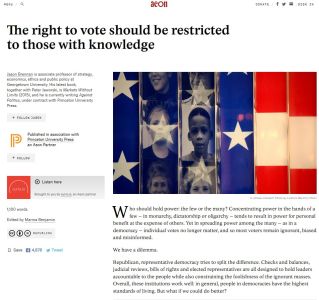
Jason Brennan
The Right to Vote Should Be Restricted to Those with Knowledge
Aeon, 2016
What's inside?
It’s been said that democracy is where any two idiots can outvote a genius. Should that change?
Recommendation
Jason Brennan – a professor of strategy, economics, ethics, and public policy at Georgetown University – reflects on the benefits of limiting the right to vote to knowledgeable, well-informed people. He examines the inherent flaws of democracy and suggests “epistocracy” as an alternative. Brennan fails to address some of the disadvantages of the system he commends: Would people really accept the legitimacy of a government that they weren’t allowed to elect? Still, getAbstract recommends this provocative essay as food for thought for democracy enthusiasts and skeptics.
Take-Aways
- By and large, people in democracies enjoy a better standard of living than citizens of nondemocratic states.
- The uninformed voter presents a threat to democracy.
- An “epistocracy” might allow only citizens who pass a test of basic political knowledge to cast their votes.
- Alternatively, statisticians could calculate a person’s intent based on the actual vote, along with demographic information and answers to a knowledge test.
- Arguably, the system would still leave those excluded from the vote better off than democracy.
Summary
Power in the hands of an elite leads to gains for a few at the top for which the rest must pay. Yet, if power is in the hands of the masses, individual input has less impact, and people “remain ignorant and misinformed.” Representative democracy mitigates this problem with checks and balances, independent judiciaries, bills of rights and elected legislatures that hold leaders responsible. For the most part, this system is successful: People in democracies tend to enjoy higher standards of living. But a different system could keep what democracy does well and safeguard against its flaws: An “epistocracy” could have the same institutions and checks and balances but would allocate voting power in relation to knowledge and competence.
“The idea here is not that knowledgeable people deserve to rule – of course they don’t – but that the rest of us deserve not to be subjected to incompetently made political decisions.”
One way to implement it would be to deny the right to vote to those who cannot pass a simple politics exam or to give citizens with proven expertise more than one vote. Another option would be to count all votes but to amend the system with a group of experts, who can “veto badly designed legislation.” Or, voters could answer knowledge questions and submit demographic information, which would then allow statisticians to extrapolate what citizens would have chosen had they had more knowledge.
“Voters tend to mean well, but voting well takes more than a kind heart. It requires tremendous social scientific knowledge: knowledge that most citizens lack.”
Some people may claim that the democratic system is a crucial means of expressing that “everyone is equal.” Instead, view the system more like that of professional certifications: Just because you don’t receive a plumber’s license doesn’t make you feel less of a valued member of society. Of course, certain demographics (for example, rich white men) will be more likely to obtain voting rights than others (for example, poor black women), but political scientists have shown that people will tend to vote in favor of the common good. Still, in the end, poor black women – or whichever group is excluded from the vote – may still be better off than in the current system.
Of course, epistocracy has its flaws – as does democracy. Ultimately democracy and epistocracy give power to the masses. But epistocracy tries to protect informed voices against the din of the ill-informed.
About the Author
Jason Brennan is an associate professor at Georgetown University and specializes in politics, philosophy and economics. He is the author of numerous books, among them Against Democracy.
This document is restricted to personal use only.
My Highlights
Did you like this summary?
Read the articleThis summary has been shared with you by getAbstract.
We find, rate and summarize relevant knowledge to help people make better decisions in business and in their private lives.
Already a customer? Log in here.


















Comment on this summary
Thus, how transparent and "true" could the process for this to ever occur be?